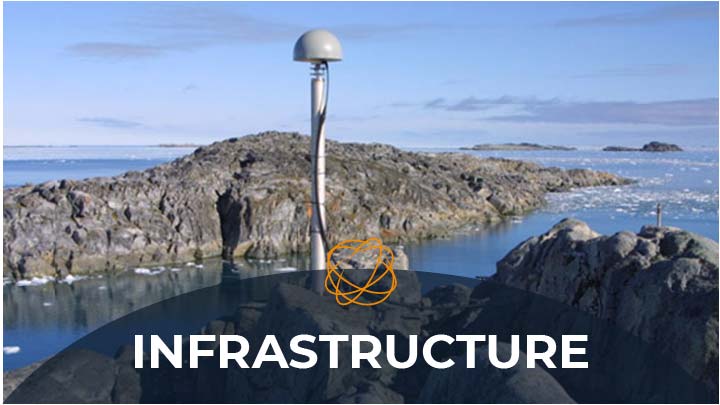Infrastructure Committee
Coordinator: Markus Bradke
Vice Coordinator: Ryan Ruddick
Mailing List: IGS Infrastructure Committee Mailing List
Charter: Infrastructure Committee Charter
The IGS Infrastructure Committee (IC) is a permanent body established to ensure that the data requirements for the highest quality GNSS products are fully satisfied while also anticipating future needs and evolving circumstances. Its principal objective is to assure that the IGS infrastructure components that collect and distribute the IGS tracking data and information are sustained to meet the needs of principal users, in particular the IGS Analysis Centers, fundamental product coordinators, pilot projects, and working groups.
The IC fulfills this objective by coordinating and overseeing facets of the IGS organization involved in the collection and distribution of GNSS observational data and information, including network stations and their configurations (instrumentation, monumentation, communications, etc), and data flow. The IC establishes policies and guidelines, where appropriate, working in close collaboration with all IGS components, as well as with the various agencies that operate GNSS tracking networks. The IC interacts with International Association of Geodesy (IAG) sister services and projects – including the International Earth Rotation and Reference Systems Service (IERS) and the Global Geodetic Observing System (GGOS) – and with other external groups (such as the RTCM) to synchronize with the global, multi-technique geodetic infrastructure.
Charter
Preamble
The IGS Infrastructure Committee (IC) is a permanent body established to ensure that the data requirements for the highest quality GNSS products are fully satisfied while also anticipating future needs and evolving circumstances. Its principal objective is to assure that the IGS infrastructure components that collect and distribute the IGS tracking data and information are sustained to meet the needs of principal users, in particular the IGS Analysis Centers, fundamental product coordinators, pilot projects, and working groups. The IC fulfills this objective by coordinating and overseeing facets of the IGS organization involved in the collection and distribution of GNSS observational data and information, including network stations and their configurations (instrumentation, monumentation, communications, etc), and data flow. The IC establishes policies and guidelines, where appropriate, working in close collaboration with all IGS components, as well as with the various agencies that operate GNSS tracking networks. The IC interacts with International Association of Geodesy (IAG) sister services and projects – including the International Earth Rotation and Reference Systems Service (IERS) and the Global Geodetic Observing System (GGOS) – and with other external groups (such as the RTCM) to synchronize with the global, multi-technique geodetic infrastructure.
Tasking
The IC is a forum of experts that develops policies, standards, guidelines, recommendations, and other initiatives to maintain and improve the GNSS data and information systems upon which IGS product quality and responsiveness rely, thus ensuring the overall effectiveness of the Service. The IC works on an ongoing basis with the Governing Board and Station Operators, Data Centers, Analysis Centers, Pilot Projects, Working Groups and the Central Bureau to define ways to improve access to high-quality GNSS data and information. The IC works with the IGS Network Coordinator and with regional network partners (EUREF, SIRGAS, APREF, etc.) to promote regional densification, to ensure that the policies, standards, guidelines and recommendations developed by the IGS are used within regional networks, while accommodating regional networks specific needs and timelines. Improving the network of tracking stations is the highest priority of the IC. The IC will continuously assess the IGS organization, standards and procedures and facilitate improvements as needed to assure responsiveness to the principal user’s needs is sustained. Some of the activities of the IC will include:
Data Center Coordination
The IC coordinates the IGS Data Center issues in close coordination with the Data Center Coordinator, the Data Center Representatives and the other infrastructure elements of the IGS, since they are all intimately related. The IC formally assumes the duties from the former Data Center Working Group.
Network Coordination
The fundamental responsibility for station installation and operation relies on contributions from operational agencies. Therefore, a framework is required that enables a globally well distributed set of reference stations of the highest quality to be defined, deployed, and long-term maintained for public access. The IC will evaluate the historical IGS role in the management and coordination of its network with a view towards improved effectiveness, sustainability, higher quality, new product development, and evolving GNSS circumstances, technologies, and knowledge.
Network Monitoring
The IC will evaluate procedures for continuous monitoring and reporting GNSS data flow and data quality. The IC will work with the Station Operators, Data Centers and Central Bureau to improve present systems for tracking key performance metrics, detecting and reporting anomalies, and circulating information. The IC will promote and encourage compliance with IGS conventions, guidelines and procedures.
Station Installation and Operation Guidelines
Policies and procedures for installing and operating GNSS stations will be continuously reviewed to assure that the highest possible data quality is maintained in view of evolving knowledge and external circumstances. Changes in GNSS transmit signal characteristics and in receiver technology are particularly important aspects that must be taken into explicit account. This activity requires close coordination with all the various agencies and groups involved in station operation, as well as with IGS Analysis Centers, Working Groups, and Pilot Projects.
Data Exchange Formats
Although many aspects of data exchange formats are addressed within the IGS by the Analysis Centers, Data Centers, Working Groups, and Pilot Projects, the IC can provide coordination for those products that are widely used, especially outside the IGS. The IC will consider the role of the IGS within external standards organizations, such as the RTCM.
Real-Time Activity
Special attention will be devoted to the appropriate role of the IGS in the coordination and distribution of real-time GNSS data, which must directly involve the IGS Real-Time Working Group and the Real-Time Service, as well as with such external groups as RTCM
IAG Service Interaction
The IC will work with IAG sister services regarding infrastructure issues that extend beyond IGS, such as the requirements for multi-technique co-location sites. This will be accomplished by participating within related organizations and their projects, committees, working groups and other activities. Examples may include participation in IERS activities as GNSS technique representatives where appropriate, or participation in the GGOS Networks Bureau.
Download Infrastructure Committee Charter
[Revised Feb 2023]
Members
Leadership
The Committee will be led by the Infrastructure Committee Coordinator and Vice Coordinator. The Coordinator shall be responsible for:
- Coordinating the activities of the Committee.
- Communicating with the IGS Governing Board and with other IGS committees and working groups.
- Organizing and chairing Committee meetings.
- Reporting to Committee activities to the Governing Board.
The Vice Coordinator shall assist the Coordinator in the performance of these duties and shall assume the Coordinator’s responsibilities in the Coordinator’s absence.
The Coordinator shall be nominated by the Appointed Members and appointed by the Governing Board.
The Vice Coordinator shall be nominated and appointed by the Appointed Members of the IC.
Both roles will be appointed for a four year term with no term limits.
Appointed Members
The Committee will consist of the following appointed members:
Ex-officio Members (10)
- Analysis Centre Coordinator
- Data Centre Coordinator
- Network Coordinator
- Reference Frame Coordinator
- Clock Product Coordinator
- Real-Time Service Coordinator
- RINEX Working Group Chair
- Network Representatives (3)
Data Centre Representatives (6)
- One representative from each active IGS Global Data Center.
Other Members (max. 5)
Nominated and approved by the Appointed Members. ● Need to be an IGS Associate Member. ● Mostly representatives from major GNSS networks or data centers or specialists with specific technical or ICT skills. ● Appointed for a two-year term with no term limit.
Non-Appointed Members
The IGS Infrastructure Committee is open to all Associate Members who have an interest in the sustainment and enhancement of the IGS Infrastructure. Non-Appointed members do not have voting rights but are encouraged to actively participate in the Committee.
Voting
Any matters requiring a decision of the Committee will be decided by a simple majority vote by Appointed Members.
Meetings
The IGS Infrastructure Committee shall meet at least once per quarter, either in person or virtually, to discuss the status and progress of the IGS infrastructure, review and update standards and guidelines, and address relevant issues and risks.
Subcommittees
The IGS Infrastructure Committee may establish subcommittees to address specific topics or tasks related to the development and maintenance of the IGS Infrastructure. The subcommittees shall be chaired by a member of the Infrastructure Committee and shall report their findings and recommendations to the full Committee.
Amendment of the Charter
This Charter may be amended by a simple majority vote of the Appointed Members.
Infrastructure Committee News
Last Updated on 23 May 2025 17:34 UTC


